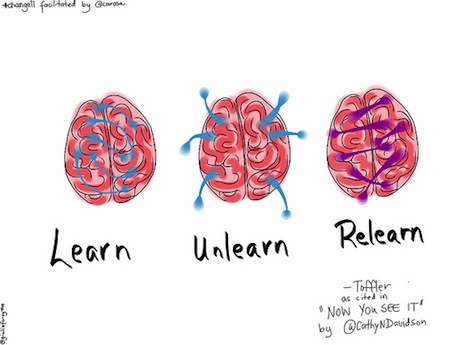Chinwag Psych Interview: Karen Pine "Breaking the Habit - The Professional Perks of Behavioural Flexibility."
Getting ready for the Chinwag Psych conference next month? On May 9, a you can find out how neuroscience, machine learning and psychology are good for business.
One of the speakers sharing knowledge is Professor Karen Pine. She’s an author, a founding director of Do Something Different and holds the post of Professor of Developmental Psychology at the University of Hertfordshire, so she knows a thing or two about how to motivate teams in business.
The underlying message for Do Something Different is learning by doing. So how does this apply to business? We had a chat with Karen about how changing your ways can help you professionally as well as personally.
 “It's about adaptability and agility,” Karen told us. “If you've got individuals who can respond to changes in the market, to changing for customers needs; if you have behavioural flexibility and you can do so quite easily without getting stressed by it - then you have a good armoury at your disposal. This way you can pull out the right behaviours and change your strategy if necessary and generally to adapt in a changing world.”
“It's about adaptability and agility,” Karen told us. “If you've got individuals who can respond to changes in the market, to changing for customers needs; if you have behavioural flexibility and you can do so quite easily without getting stressed by it - then you have a good armoury at your disposal. This way you can pull out the right behaviours and change your strategy if necessary and generally to adapt in a changing world.”
The Brain Hooked on Habit
Karen says that it is human nature to get entrenched in doing the things we like in the ways we have done them in the past.
In fact, habits appear to be something our brains like too and in the right circumstances it can be very efficient.
“The brain detects patterns and likes to see regularities,” says Karen. “It operates on an efficiency principle - so it doesn't want to expend too much energy on always thinking about things in a new way. It's more efficient to have a rule of thumb or to have a well worn pathway that we can keep using and that saves energy. It is sort of hard wired to be quite efficient in that way and develop lots of habits.
“That can be really good for us though, that's how we can learn, and do things on autopilot which frees up cognitive resources for other tasks. It's why we can just put on a seat belt when we get into the car without having to stop and think about it.”
She adds that automatic behaviours can be good for us and there are many valuable habits, but we shouldn’t automate everything we do and even getting out of a simple habit can stimulate greater change.
“It's good to think ‘I always sit in this chair when I eat my dinner, I should sit somewhere else’. Or, ‘I always respond to this person in the same way and actually, it's not working so I need to change it.’ It's the old saying, we only get something different when we do something different,” says Karen.
But doesn’t habit also breed confidence? Karen notes that what might be see as confidence could be more of a comfort zone.
“When a problem comes up, you know you can always deal with it the way you have always dealt with those kinds of issues,” she explains. “So you have a comfortable way of behaving, reacting and responding to challenges. But the confidence might be a little misplaced. We have to be a little bit careful about getting too confident, the economic crisis demonstrated this to us, the bankers got very cocky and confident and look what happened to them!”
So how can a company instigate positive change without complete disruption?
Karen sees that there are some problems with the courses and away-days commonly found in the workplace. Some courses might look great, but they don’t always provide a means to change habits.
“For a long time there has been this knowledge model, that people don't know what they should be doing and if we tell them they will go away and do the right thing,” she says. “But we don't because human beings are habit machines and they go back to do what they've always done. Classroom-based learning is often unsuccessful, it isn't applied in the workplace and it doesn't get translated into behaviour.”
Upsetting the whole apple cart in order to enforce change is also a difficult proposition. “Big change is impossible, we don't like it as human beings and it doesn’t come to us very easily,” says Karen. “We tend to dig in our heels and resist it. Even though we may know it's the right thing to do and there's logic behind it. We've found that very small changes, getting someone to do something different every day can have a cumulative effect.
“It's easy for people, so they are less resistant to it. Gradually over time they start to see different results and it becomes self-reinforcing and it also means that these changes can be implemented in the working day. It could be saying hello to someone you don't usually speak to or going for a coffee with a junior colleague. They’re not great big changes but they can open doors to new opportunities, discoveries and types of learning.”
Doing That can Lead to Thinking and More Doing
The Do Something Different approach turns a traditional learning model around to help people change gradually. By doing things, Karen says that we can use those actions to change our minds
“Traditionally we introduce cognitive change, thinking; and then behaviour change will follow. That doesn't work very well, it's often more effective the other way around, to change behaviour and as a result we have different thoughts.”
Psychology for Business
The idea of putting psychology into action in a business might seem like time that could be used making sales or forming strategies for management. But Karen and her co-founder, husband Ben Fletcher, have seen many examples where psychology has done well at the centre of change for the better.
“The problem with psychology is that it has been mistranslated,” says Karen. “People take it as something that is a bit dry and academic. We help people to understand how it applies to their daily lives or to the everyday working lives of their teams or their staff.”
We spend a huge amount of our time at work, so maybe managers and CEOs should be looking at how their staff are performing psychologically as well as on spreadsheets.
“It seems a no-brainer to me,” says Karen. “There are studies that have shown that engaged employees affect the bottom line. If your employees are coming to work and feeling engaged, stimulated and happy, your customers will be treated better, your staff will be more productive, there will be less absenteeism and better relationships between people. To me it seems absolutely obvious if you want to have a successful business you've got to have engaged staff.”
At Chinwag Psych, Karen will be showing how Do Something Different uses technology to deliver small positive actions to people and how her company can diagnose others and see where they are not using as much of their natural behaviour as they could be.
"We can prescribe for an individual, a course of action that is going to expand and stretch them. It could be to increase their engagement or making them feel more valued or reducing work stress,” she says.
“What we know as psychologists we've translated into a program that can be delivered online so people can be trained while they go about their working day - almost without knowing it.”
A simple way to increase positive change with little effort sounds like an interesting way to create a happier workplace. To find out more, meet Karen Pine at the event.
// Grab yourself a ticket right here.
Photo (cc) giulia.forsythe.





